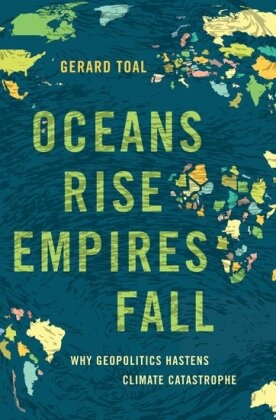Oceans Rise Empires Fall - Why Geopolitics Hastens Climate Catastrophe
| Verlag | Oxford University Press |
| Auflage | 2024 |
| Seiten | 280 |
| Format | 15,2 x 22,6 x 2,8 cm |
| Print PDF | |
| Gewicht | 522 g |
| Artikeltyp | Englisches Buch |
| EAN | 9780197693261 |
| Bestell-Nr | 19769326EA |
In the last few years, it has become abundantly clear that the effects of accelerating climate change will be catastrophic, from rising seas to more violent storms to desertification. Yet why do nation-states find it so difficult to implement transnational policies that can reduce carbon output and slow global warming? In Oceans Rise, Empires Fall, Gerard Toal explains why geopolitical competition is the primary obstacle. In a world of interstate rivalry, nations tend to always prioritize acquiring the fossil fuels necessary for growth in the short term over working toward a zero-carbon future.
A powerful explanation of why geopolitical competition drives climate breakdown and inhibits action to prevent it.
It is the decisive decade for climate change action, yet great power competition is surging. Geo-economic rivalries and territorial conflicts over Ukraine and Taiwan appear more important than collective action against catastrophic climate change. Why do great powers favor competition and rivalry over transnational policies to address the greatest threat humanity has ever faced?
In Oceans Rise Empires Fall,Gerard Toal identifies geopolitics as the culprit. Examining its meaning, history, and leading thinkers, he exposes the geo-ecological foundations of geopolitics and the struggles for living space that it expresses. The book isolates three Earth-controlling practices that characterize geopolitics. The territorial control imperatives of great powers preclude collaborative behavior to address common challenges. Competing world historical missions drive r ivalries and wars, like Russia's fossil-fuel-funded aggression against Ukraine. Military-industrial competition over leading edge technologies and critical minerals takes priority over collaborative decarbonization policies. In the contest between geopolitics and sustainable climate policies, the former takes precedence-especially when competition shifts to outright conflict. In this book, Toal interrogates that relationship and its stakes for the ongoing acceleration of climate change."
Inhaltsverzeichnis:
Introduction: Rising Threats
1. Geopolitics All Around
2. Grounding Geopolitics
3. Making Geopolitics Critical
4. Territorial Anxieties
5. Missions and Emissions
6. Higher Further Faster
7. Geopolitical Condition Red
Conclusion: Uncharted Territory

